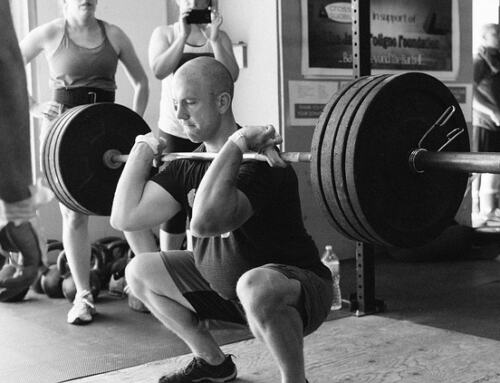Overcoming a Negative Body Image: 4 Things to Remember
“You will never be free until you free yourself from the prison of your own false thoughts.” ~Philip Arnold
I really don’t remember my life before anorexia. I think back to my early teenage years when I ate peanut butter sandwiches and drank hot chocolate without a single thought of how many calories I had consumed. There was no guilt, no worry, no need for perfection. How I wish I could get those carefree moments back.
A few years ago anorexia completely distorted my perception of myself. All it took was one seemingly innocent comment from my classmate: Haven’t you gained weight recently? From that moment on, I no longer saw a healthy, fit person when I looked into the mirror. All I saw was an imperfect body.
Meticulous calorie counting, diet restriction, and exercise time logging began to fill day after day. I wasn’t living as a human, but rather as an engineer treating my body as a machine. I loved myself for every pound I lost, every piece of clothing that felt a bit looser, and every little bit of food I managed to leave on my plate.
I felt like a crazy person because my reasonable self knew that I shouldn’t be starving myself and exercising ridiculous number of hours every single day. I knew exactly what was wrong with me except there was nothing wrong.
Somewhere in the evolution of the illness, I lost control. I ate one apple a day, drank only water, ran ten miles every morning, did squats and push-ups while studying, and paced in my room instead of sleeping. Nobody asked any questions, so I didn’t provide any answers.
And then one day I was finally rewarded with my target weight glowing on the scale. I had done it! The hard work had paid off and I was free. Or so I thought. The control I now had over my body was deceiving. Once I reached my target weight, I couldn’t stop. The rush was too inviting. Every extra pound lost felt like a victory.
4 Things to Remember When You’re Under the Spell of a Negative Body Image
Negative thoughts about your body consume you. They take and take and take. To recover, you essentially have to figure out who you are again. You have to build yourself up from the smallest bits of what you know of yourself. You have to differentiate yourself from the condemning voice. Here are some of the things I learned (and had to embrace) on my way to recovery.
1. Not all thoughts are facts.
The problem with a negative self-image is that it feels like a fact. You can easily convince yourself of something that is not true. Even at 5’7” and my lowest weight (ninety pounds), I believed that I needed to be thinner.
I felt that my waist wasn’t slim enough, my arms weren’t toned enough, and my thighs weren’t narrow enough. My mind was a very thorough liar, and there was nothing anyone could say to convince me otherwise.
If I hadn’t learned about these lies and how to discern them, I would probably never have gotten out of that vicious cycle.
You might have a hard time discerning truth from lies in the beginning, so instead of questioning whether your thoughts are facts, ask yourself which ones serve you and which do not.
Growing up with an athletic sister, most of my negative thoughts evolved around my body. I could objectively say that although I was very thin, I wasn’t particularly lean. So I signed up for a gym membership and started lifting weights.
However, what was initially a constructive thought—that it would serve me to build muscle—turned into an obsession within a few months.
I remember standing in a basement gym, pushing a heavy barbell above my head, when I realized I was crying. I let my tears roll down my cheeks and focused back on the barbell. I had to finish my workout. I was exhausted and hungry from all the workouts I put my body through every single day, but all I could think of were toned arms and washboard abs.
I think I knew long before that day that my desire for a lean body was no longer serving me. However, I couldn’t stop exercising. I had to sweat. I had to feel my heart race. My life revolved around my fitness routines.
I knew then I needed to challenge the thoughts that told me I wasn’t lean or fit enough, and adjust accordingly.
That isn’t to say that I stopped working out altogether. There are days I still experience anxiety when I know I won’t be able to get to the gym. But any time a destructive thought about my not-so-toned body pops up, I remind myself this doesn’t serve me and do my best to let it go and focus on something more positive. I may not have the leanest body, but I am more than just my physique.
2. Absolute control is an illusion.
Eating disorders are all about control. Control issues with what goes into your body and what comes out of your body. It’s about exerting control over at least one aspect of your life. However, it’s an illusion. In fact, you may feel in control, but be very out of control. The more successful you are at exerting control over how much food you take in, the less control you actually have. The eating disorder and twisted ideals are controlling you.
Right before I hit rock bottom, I was paralyzed with fear and crippled with anxiety. I needed the eating disorder. I needed the identity and illusionary control it gave me. If I felt I got everything under perfect control, I felt strong. Paradoxically, that’s when I ended up under the doctors’ and my parents’ supervision, with no control over my food intake.
Letting go of control was the hardest part. I would be lying if I said I no longer struggle. However, I’m much better at reminding myself that the greatest control is in letting go of the need for it.
3. Perfectionism is unattainable.
Perfectionism goes beyond doing your best. It’s about setting extremely high standards that are unrealistic. In my perpetual quest for perfection, I believed I could meet those high standards. I strived for perfection in my studies, relationships, cleanliness, exercise, and diet. Mediocrity was unsatisfactory. It was all or nothing.
Perfection is so addictive because it locks you into thinking that if you do everything perfectly, you can minimize the feelings of pain and judgment. But the truth is, you can’t. There will always be people in your life who judge you no matter what you do or what you say.
The one thing you can do is to surrender. Accept that you are work in progress. Embrace all parts of yourself, even those that seem “imperfect” to you. Practice forgiveness and self-compassion. And most importantly, be patient. Adopting new patterns of thinking takes time, but the work is worth it.
4. Food isn’t the enemy.
The difficulty with negative body image is that it’s closely tied to weight (and therefore, food). But unlike a drug addict, you can’t avoid the trigger. You can’t simply avoid food for the rest of your life, although it is very tempting to adopt the mindset that the fewer calories you eat, the better.
In that sense, healthy eating literally saved my life. Fueling my body with simple whole foods shifted my focus from calorie counting to nourishment. Instead of weighing myself several times a day, I focused on my health.
At times, I still pay attention to how my clothes fit and how I look in the mirror, but food is no longer the enemy. It’s the means to achieve the good health we all find so radiantly beautiful—glowing skin, shiny hair, and a fit, strong body.
Silencing the Voice
Do I still struggle at times? Yes. However, when my negative thoughts and struggles reappear, I no longer let them run my life. I recognize them as something I must overcome. There are days that I have to make a conscious effort to eat and not panic when the scale shows an increase. But thankfully, I know the price of letting fear take over my life.
I know that one day I’ll be able to step on the scale and not cringe at the numbers that appear in front of me. One day, I’ll be able to eat a meal without thinking about calories. One day, my mind will be completely free. Until that day, I keep silencing that voice.
[…]






